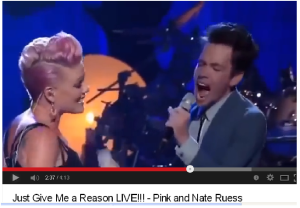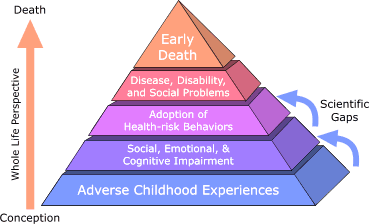 In last week’s blog, I was surprised by sudden overwhelming feelings of being loved which could only be described as physical. I’ve had these odd explosive physical experiences before. I had one with music so striking at the end of last year, that I wrote to brain scientist Dr. Bruce Perry (left) about it. Why? He’s got rhythm!
In last week’s blog, I was surprised by sudden overwhelming feelings of being loved which could only be described as physical. I’ve had these odd explosive physical experiences before. I had one with music so striking at the end of last year, that I wrote to brain scientist Dr. Bruce Perry (left) about it. Why? He’s got rhythm!
My blog on Perry last Sept. 13 “How Your Brain Works 101” notes the three broad areas of the brain: the brain stem aka reptilian survival brain, a knob atop the spinal cord that reptiles have too, which regulates raw survival functions; the limbic brain, first developed in mammals, which wraps around the brain stem and regulates emotions; and the cortex or thinking brain, which wraps around all the rest.
Next I quoted Perry on how the apparently primitive brain stem is the key to the whole shebang:
“Because the brain is organized in a hierarchical fashion, with symptoms of fear first arising in the brain stem and then moving all the way to the cortex, the first step is brain stem regulation,” Perry said. This, he revealed, requires “patterned, repetitive rhythmic activity.” Examples are “dance, music, or massage, especially for children whose persisting fear state is so overwhelming that they cannot improve via increased positive relationships, or even therapeutic relationships, until their brain stem is regulated by safe, predictable, repetitive sensory input…
“The only way you can move from these super-high anxiety states, to calmer more cognitive states,” Perry said, “is rhythmic regulation: Patterned, repetitive rhythmic activity: walking, running, dancing, singing, repetitive meditative breathing – you use brain stem-related somato-sensory networks which make your brain accessible to relational [limbic] reward and cortical thinking. If you want a person to use relational reward, or cortical thought – they’ve got to be emotionally regulated first!”
Two months after that Sept. 13, 2013 blog, I had a musical experience so intense that I wrote this letter :
Dear Dr. Perry,
I just had an explosive physiological experience which demonstrates your thesis that “We must regulate people with patterned, repetitive, rhythmical activity, before we can persuade them with a cognitive argument, or compel them with an emotional affect.”
 It involved the attached song. Ever consider using music in your presentations? One audio example can pack quite an emotional punch to get audiences to see how deep your ideas actually are. [I sent the audio MP3 but here’s the whole video: www.youtube.com/watch?v=p_sDwUFQkt4] And the healing has to go ‘way far deep to tune up some of us who have seriously jangled cells.
It involved the attached song. Ever consider using music in your presentations? One audio example can pack quite an emotional punch to get audiences to see how deep your ideas actually are. [I sent the audio MP3 but here’s the whole video: www.youtube.com/watch?v=p_sDwUFQkt4] And the healing has to go ‘way far deep to tune up some of us who have seriously jangled cells.
I’ve sung and conducted operatic music for 25 years; Mozart, Bach, Beethoven. Not your average rocker. So this train of events is pretty unusual, which also kinda proves your case. Here’s what happened:
Today I was feeling some fear and anger triggered by a friend who occasionally flips out and disconnects emotionally when the holidays approach (a rough emotional time for us all). I began to dissociate a bit from the disconnect, and boy do I hate that frozen feeling; the pain is terrible.
Suddenly the attached recording by P!nk popped up on my MP3 player earphones while I was doing a chore.
Within five seconds I had pretty much involuntarily dropped everything and found myself dancing violently around the condo – and I do mean violently. I had to take off my socks since without skin traction against the carpet I’d have slipped and broken my neck. I was dancing that hard. I was banging my hands against the walls at certainly points. My body also went into the usual full-body infant sobbing, just thrashing away.
Then it hit me: as usual, the real problem wasn’t with “the person in my present” at all. My real problem was that my present experience of emotional disconnect, had brought up “the pain from my past.” There was actually deeply buried grief coming up, from the way my husband of 27 years, and before him, my mother, used to disconnect as a way of life – repeatedly and continuously disconnecting and pushing me away emotionally over decades.
The present-day incident was only a trigger, and an opportunity. I’ve learned to use “incidents in my present” as a “pull-tag” – to pull up the more important buried pain from my past and grieve that in order to get rid of it! So I did.
Just thump and bang
The first thing according to your formula, was to just thump around a lot dancing. My body more or less did that without asking me. This P!nk song is a great example; it has intense patterned, very reliably repetitive, highly rhythmical activity. To be blunt: it bangs. Think “native drum circle.” My brain stem says: “I feel angry – ok, I can bang!”
You’re right: it’s important for the brain stem that the body be able to simply bang – over and over and over. For me, and I’d bet a lot of folks, it’s a form of “infant protest” against the developmental trauma of being disconnected.
Second, we need “love and acceptance” (limbic brain) when we come out of the closet and just simply bang. We need to bang, protest, beat the drums in a social (limbic) context. As you’ve noted, that’s why native cultures do drum circles all over the world. That’s why Vietnam vets do drum circles on beaches all over California.
Third, the words (thinking brain) are very intense and “relevant” – and you keep emphasizing, “It’s got to be relevant” to the trauma at hand.
The song is a duet between P!nk (soprano) and Nate Ruess (tenor). The soprano is paranoid that the tenor doesn’t love her anymore, he’s talking in his sleep, he must have someone else. Her words are all about the trauma of emotional disconnect – which often gets us caught in arguments fatal to relationships.
But the tenor doesn’t get caught. Instead, he responds: “You’ve been having real bad dreams” (no doubt due to her childhood trauma), but “your head is running wild again, my dear, we still have everything!” I’m here for you now and I really do love you. “I’ll fix it for us – our love’s enough,” he sings. He’s saying he loves her enough to put in real work on it, our love is that important.
Mis-Attune – Repair
 I was completely overwhelmed by the feeling the tenor models of REPAIR. “My God, he loves her enough to do REPAIR,” I kept thinking, as if witnessing some impossible miracle which had never before occurred on planet Earth.
I was completely overwhelmed by the feeling the tenor models of REPAIR. “My God, he loves her enough to do REPAIR,” I kept thinking, as if witnessing some impossible miracle which had never before occurred on planet Earth.
Attachment Theory leader Dr. Allan Schore (above) writes about “attune – mis-attune – repair.” That means learning that getting out of tune with another is not the end of the world, as we in trauma often experience it to be in childhood. Gosh I certainly had! But Schore says that instead, getting out of tune, if handled well, can be a temporary and very useful learning experience.
When we get out of tune, instead of slamming the door on each other, we can learn to take it as a signal that we both need a time out. We can learn to sit down, take deep breaths, get back in touch with ourselves – and then talk it out in a collaborative way. We can express our fear and hurt and anger in reasoned words, only – instead of acting out with doors or verbal abuse. After we each feel that we’ve been seen and heard, we’ll often feel better. Doing this we also get to know each other better, so we grow closer for the whole experience. Tricky but potentially invaluable.
The more I brought the word “repair” into consciousness – the harder my legs and arms wanted to bang on the floor and the walls, stretching out to the four corners of the globe. And then I knew it wasn’t even about my 27-year marriage coming up. My body was telling me it went a whole lot deeper.
Repair, was what my mother never could do. If anything went wrong, if anything didn’t go so as to satisfy her (which was pretty difficult) – she would fly off the handle and disconnect. The cold shoulder often went on for weeks at a time, why not? She was mad.
Repair? “Repair? ‘Let’s make up? ‘ Are you out of your mind?” I can hear mom saying. I had sinned terribly somehow and it was out of the question for her to talk to me or look at me nicely; I didn’t deserve it.
The very concept of repair, the idea that human beings ever did any such thing, in fact, had never crossed my mind as a possibility in human relations – until I read about it in Allan Schore in 2011.
So yeah, “He loves her enough to do REPAIR!” was enough to make me barf up, process, and release some really deep grief. Like from kindergarten. Like about my Mom, not anyone in my present.
Afterward, as usual when I can manage to feel the childhood pain, bang it out and be done with it, I felt absolutely fantastic. That’s what music can do with patterned, repetitive, rhythmical activity.
The Back Story
 Also fun is the “back story” as to how this “rock bit” got onto my MP3 player.
Also fun is the “back story” as to how this “rock bit” got onto my MP3 player.
About six months ago, shortly after I heard your March 8 UCLA talk, I was out food shopping. Suddenly this P!nk duet came blasting out of the grocery store sound system; it seemed everyone knew it but me. I’d never heard it before – I had no idea what in heck it was.
But suddenly I was dancing around the Korean vegetable store, stomping my feet and raising my arms to the ceiling in a peal of pure unadulterated joy – much to my own shock and to the surprise and delight of the onlooking shoppers (Koreans adore music). And I’m a pretty good dancer, which figures. I guess that’s why so many abused women end up becoming dancers of some sort, ballet or pole. Check out ballerina Gelsey Kirkland’s book “Dancing on My Grave.” No Polish jokes, please, I’m Polish.
So yeah, we get release when we do “patterned, repeated, rhythmical activity” – at the oddest times. Then the creativity flows. Later I downloaded the audio of the P!ink duet and filed it away on my MP3 player, where it popped up conveniently six months later as the subject of this letter.
Using music in your presentations? I wonder how many of your clinical audiences have ever had a personal experience of this? Could have a massive impact. So if you ever want a musical trauma consultant, I’m your gal.
You rock, Doc!
————————-
Kathy’s news blogs expand on her book “DON’T TRY THIS AT HOME: The Silent Epidemic of Attachment Disorder—How I accidentally regressed myself back to infancy and healed it all.” Watch for the continuing series each Friday, as she explores her journey of recovery by learning the hard way about Attachment Disorder in adults, adult Attachment Theory, and the Adult Attachment Interview.
24,894 total views, 3 views today



I only discovered your writing two days ago. I can’t stop reading. Thank you so much! It is my path to healing I believe. It all suddenly makes sense. I think I need to really feel the preverbal painful kid stuff to be able to be free. My chest literally pains daily at the moment. I also love music, grew up listening to classical and Beethoven’s 9th has special significance. For a long time after my dad died in couldn’t listen to any classical though. 3 years on I’m slowly returning to it. It does bring on the tears. I long to connect to humans but have such difficulty. I am sharing loads of your book with my therapist. Thank you again and I hope you are well.
I’m praying for your healing! Yes, pre-verbal child and infant trauma often hurts us in the chest, mine too. That’s why I use music to reach my painful parts and break them loose, then the pain resolves. It’s called “body work,” here’s my blog on it:
http://attachmentdisorderhealing.com/featured-topics/healing-body-work/ Also see this page for healing: http://attachmentdisorderhealing.com/resources/tools/
Robert, my heart goes out to you! Great blog, Kathy. I can only imagine you dancing around wildly in the Korean vegetable market. I used to sing and have lots of Pink Albums. So I have heard this song before. But reading this blog was the first time I really listened to it.
I like the words “we’re not broken, just bent….. we can learn to love again”. I think it may be possible to learn to love again…. Great blog!
Hi Kathy,
That song by P!nk kicked my butt too. I’m not sure when I first heard it but it reflected a dynamic in my marriage which has been in dis-repair for several years. The vocal crescendo that starts with the duo singing “nothing is as bad as it seems” and ends with P!nk belting out: “we’ll come clean.” [Tearing up now writing this] Unfortunately, I think repair in my marriage in is beyond hope. The grief this song brings up though is intense. Thanks for sharing!
Victor
Pingback: Music Therapy and Child Trauma | "Don't Try This at Home"
Dear Victor,
Please know I am with you in your grief. I’m so sorry for your emotional loss; it is intense. We almost never “come clean” – but the fact is, we all desperately need to.
Clean out our souls by sharing their real emotional contents with each other; that has got to be the origin of the idea to “come clean.” That kind of deep sharing is what repairs relationships.
Ouch, it hurts when we don’t. Because then we have to keep carrying the grief around and usually it freezes (as in fight-flight-freeze) and just sits there eating at us. I hate those freezes to pieces.
If you can’t get your wife to read my blog and our exchange and give deep sharing one last try, then at least have a look at the “Grief Recovery Handbook” by John James and Russell Friedman, which is what I finally used to heal my deep trauma. It’s first instruction is to find a same-sex “grief partner,” someone who is in a similar life predicament, like another man in a tough spot, and to sit and exchange our feelings with them once a week for a while. There is no substitute for sitting in person with another caring human being and sharing feelings.
We want it to be our spouse, but when it’s not, grief partners are an unbelievable relief.
A hug for you,
Kathy
Pingback: Perry: Rhythm Regulates the Brain | "Don't Try This at Home"
Pingback: How Your Brain Works 101 | "Don't Try This at Home"
Dear Kathy,
Thank You for your note above, the option of private e-mail correspondence, the virtual hug, and your warmest regards. I’m most grateful. I’ll try to follow-up later, as I’m on a time-limited public [library] internet connection. THANKS Again & Warm Regards to you, too!-Bob
Dear Robert,
First and foremost, my heart goes out to you completely, for having to walk through what you have been through. What we humans need most of all in such times is: other human beings to simply be with us, not try to change our grief or fix us, but simply to be with us. I hope you have loved ones and/or friends who can do this for you in person?
Second when time permits, please see my original blog on Perry last Sept. 13 “How Your Brain Works 101” at http://attachmentdisorderhealing.com/how-your-brain-works-101/ It lays the basis for his statements in this blog.
Third, I have experiences with music such as you described very frequently. I can also be here for you by email. If you’d like to correspond privately, please write a note here asking to be contacted privately so I know it’s ok to use your email. And if you’d like others to have the benefit, we can also correspond here in the comments.
Warmest regards and a virtual hug,
Kathy
I “inherited” much of my musical appreciation from my Mother, who attended Eastman School of Music,- and whose later handgun suicide I personally witnessed at age 15. Sometimes, currently, I find myself weeping profusely when I listen to music I usually find enjoyable. I was only able to read page 1 of the five pages this article contains. I came back to this to print pages 2-5…hopefully, it may provide a clue for me.